July 24, 2018 •
Anti-Corruption Measure to Appear on North Dakota Ballot
After gathering 38,451 signatures, an anti-corruption measure will appear on the November 6 ballot in North Dakota. If the measure is approved by voters, the ethics commission will be responsible for adopting rules related to elections, lobbying, and for reporting […]
 After gathering 38,451 signatures, an anti-corruption measure will appear on the November 6 ballot in North Dakota.
After gathering 38,451 signatures, an anti-corruption measure will appear on the November 6 ballot in North Dakota.
If the measure is approved by voters, the ethics commission will be responsible for adopting rules related to elections, lobbying, and for reporting and investigating alleged violations of those rules and related state laws.
Additionally, the measure prohibits gifts from lobbyists, prohibits the delivery of campaign contributions by lobbyists, and creates a revolving door provision banning public officials from becoming lobbyists for two years after leaving office.
This is the first ballot measure to receive enough signatures to appear in front of voters this November.
April 27, 2018 •
British Columbia Lobbyist Revolving Door Amendment Effective May 1
On May 1, revolving door amendments to British Columbia’s Lobbyists Registration Act (LRA) come into force. The new amendment mandates a person who is a former public office holder be prohibited from lobbying, in relation to any matter, for a […]
 On May 1, revolving door amendments to British Columbia’s Lobbyists Registration Act (LRA) come into force. The new amendment mandates a person who is a former public office holder be prohibited from lobbying, in relation to any matter, for a period of two years after the date the person left office.
On May 1, revolving door amendments to British Columbia’s Lobbyists Registration Act (LRA) come into force. The new amendment mandates a person who is a former public office holder be prohibited from lobbying, in relation to any matter, for a period of two years after the date the person left office.
Covered public officials include members of the Executive Council, individuals employed in the members’ offices, and parliamentary secretaries. Covered officials also include individuals who formerly occupied senior executive positions in a ministry, associate deputy ministers, assistant deputy ministers, and persons in a position of comparable rank in a ministry.
If the registrar is satisfied that it is in the public interest, the registrar may, on request and on any terms or conditions the registrar considers advisable, exempt a person from the revolving door prohibitions.
The new amendments come into force by regulation of the Lieutenant Governor in Council, pursuant to Bill 8, Lobbyist Registration Amendment Act, 2017, which received Royal Asset on November 30, 2017.
On April 26, the Office of the Registrar of Lobbyists for British Columbia announced it will be temporarily unavailable on May 1 starting at 9:30 a.m. as it makes changes to the registry.
March 21, 2018 •
Florida Revolving Door Proposal One Step Closer to November Ballot
The Florida Constitution Revision Commission (CRC) is one step closer to placing an ethics proposal on the November ballot. Proposal 39, creating an extended waiting period for state and local officials seeking to lobby after leaving office, was approved as […]
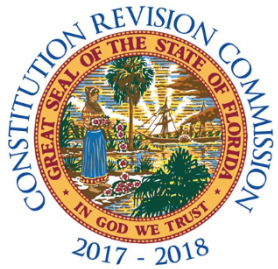 The Florida Constitution Revision Commission (CRC) is one step closer to placing an ethics proposal on the November ballot.
The Florida Constitution Revision Commission (CRC) is one step closer to placing an ethics proposal on the November ballot.
Proposal 39, creating an extended waiting period for state and local officials seeking to lobby after leaving office, was approved as amended.
The proposal prohibits state and local officials from lobbying their former departments, agencies, or governing bodies for six years after leaving office. Such persons would also be prohibited from lobbying any federal agency or any state or local body or agency during their respective terms of office.
Upon approval, the measure advanced, along with seven other proposals, to the Style and Drafting Committee. The committee has the authority to revise and combine proposals prior to a final vote by the full commission.
To be placed on the November 6 ballot, the proposal will need support from at least 22 commission members.
Once every 20 years, the Florida Constitution Revision Commission (CRC) convenes for the purpose of reviewing the state’s Constitution and proposing changes for voter consideration. The CRC travels around the state for approximately one year to identify issues, perform research, […]
 Once every 20 years, the Florida Constitution Revision Commission (CRC) convenes for the purpose of reviewing the state’s Constitution and proposing changes for voter consideration. The CRC travels around the state for approximately one year to identify issues, perform research, and propose constitutional amendments.
Once every 20 years, the Florida Constitution Revision Commission (CRC) convenes for the purpose of reviewing the state’s Constitution and proposing changes for voter consideration. The CRC travels around the state for approximately one year to identify issues, perform research, and propose constitutional amendments.
This year, the CRC is considering 37 amendments, including one related to ethics reform. The proposal, known as P-39, establishes a revolving door provision prohibiting lawmakers from lobbying local, state, and federal officials during their terms of office and prohibiting them from lobbying the Legislature and state agencies for six years after leaving office.
Similar waiting periods would apply to appointed officials as well as officials locally elected. Current law imposes a two-year waiting period and applies only to legislators and state officers or employees.
P-39 will be considered by the full CRC this week.
December 14, 2017 •
Member Lobbying Prohibition Bill Introduced in New Brunswick, Canada
On December 13, a bill was entered in the Legislative Assembly of New Brunswick prohibiting sitting lawmakers from engaging in lobbying in New Brunswick or elsewhere during and for 12 months after their tenure in office. Additionally, after a member […]
 On December 13, a bill was entered in the Legislative Assembly of New Brunswick prohibiting sitting lawmakers from engaging in lobbying in New Brunswick or elsewhere during and for 12 months after their tenure in office.
On December 13, a bill was entered in the Legislative Assembly of New Brunswick prohibiting sitting lawmakers from engaging in lobbying in New Brunswick or elsewhere during and for 12 months after their tenure in office.
Additionally, after a member is first sworn in, the member would be prohibited from being employed in or entering into a personal service contract with a business or organization engaging in lobbying in New Brunswick or elsewhere. The prohibition to lobbying for the 12 months after leaving office applies to “lobbying in New Brunswick or elsewhere in relation to a matter having a real and substantial connection to New Brunswick.”
Bill 38, An Act to Amend the Members’ Conflict of Interest Act, also creates a detailed definition of lobbying, which includes communications with public office holders in attempts to influence legislative proposals, public bills, grants, and other matters, arranging meetings between public office holders of any jurisdiction and another person, and communicating with public office holders in an attempt to influence the awarding of government contracts.
October 30, 2017 •
Oklahoma Ethics Commission Reviewing Proposed Amendment
The Oklahoma Ethics Commission held an informal meeting this week to review a proposed amendment regarding a cooling-off period for elected officials and state employees. The proposed amendment would require state employees and public officials to wait 2 years before […]
 The Oklahoma Ethics Commission held an informal meeting this week to review a proposed amendment regarding a cooling-off period for elected officials and state employees.
The Oklahoma Ethics Commission held an informal meeting this week to review a proposed amendment regarding a cooling-off period for elected officials and state employees.
The proposed amendment would require state employees and public officials to wait 2 years before registering as a lobbyist or representing another entity before the agency he or she previously served.
Supporters believe a cooling-off period prevents a conflict of interest while opponents to the proposed amendment feel it discourages involvement in government.
The proposal also includes a waiver of the restriction if the intent of the cooling-off period would not be undermined when waived.
Cabinet Ministers and other public officer holders in British Columbia will be prohibited from lobbying the government of British Columbia for two years after leaving office under a bill proposed in the legislature this week. Attorney-General David Eby, who announced […]
 Cabinet Ministers and other public officer holders in British Columbia will be prohibited from lobbying the government of British Columbia for two years after leaving office under a bill proposed in the legislature this week. Attorney-General David Eby, who announced the legislation, said the legislation is intended to “restore public confidence,” according to The Globe and Mail.
Cabinet Ministers and other public officer holders in British Columbia will be prohibited from lobbying the government of British Columbia for two years after leaving office under a bill proposed in the legislature this week. Attorney-General David Eby, who announced the legislation, said the legislation is intended to “restore public confidence,” according to The Globe and Mail.
The prohibition in the bill applies to former public office holders, which the legislation defines as a former member of the Executive Council and any individual formerly employed in the former member’s former office, other than administrative support staff, or a former parliamentary secretary.
Those listed in the definition also includes any individual who formerly occupied either a senior executive position in a ministry, the position of associate deputy minister, assistant deputy minister or a position of comparable rank in a ministry, or a prescribed position in a Provincial entity.
September 15, 2017 •
Bill Amending Revolving Door for Lobbyists Awaits California Governor’s Signature
A bill further restricting revolving door provisions was sent to Gov. Jerry Brown for consideration. Assembly Bill 1620 would change the current law prohibiting legislators from lobbying from one year to up to three years, depending on when he or […]
 A bill further restricting revolving door provisions was sent to Gov. Jerry Brown for consideration.
A bill further restricting revolving door provisions was sent to Gov. Jerry Brown for consideration.
Assembly Bill 1620 would change the current law prohibiting legislators from lobbying from one year to up to three years, depending on when he or she steps down from office. The bill states a legislator could not lobby during the two-year session after he or she was elected, plus another full year after the session ends.
If signed by the governor, the bill is effective January 1, 2018.
September 6, 2017 •
California Governor Signs Two Bills Amending the Political Reform Act of 1974
Gov. Jerry Brown signed Assembly Bill 187 and Assembly Bill 551 into law on September 1, amending both lobbying and campaign finance laws. Assembly Bill 187 requires a committee to file a report within 10 business days of making a […]
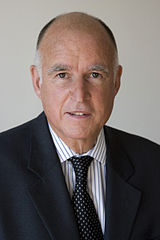 Gov. Jerry Brown signed Assembly Bill 187 and Assembly Bill 551 into law on September 1, amending both lobbying and campaign finance laws.
Gov. Jerry Brown signed Assembly Bill 187 and Assembly Bill 551 into law on September 1, amending both lobbying and campaign finance laws.
Assembly Bill 187 requires a committee to file a report within 10 business days of making a contribution or independent expenditure aggregating $5,000 or more to support or oppose the qualification of a single local initiative or referendum ballot measure.
Assembly Bill 551 extends revolving door restrictions to independent contractors of a local government agency or a public agency who are appearing or communicating on behalf of that agency.
Both bills are effective January 1, 2018.
July 10, 2017 •
Flint Residents Vote for Charter Update on Aug. 8th
In 2015, voters in Flint, Michigan selected nine members to serve on the Flint Charter Review Commission. Commissioners spent the last two years drafting the charter to be approved in a citywide referendum election on August 8, 2017. The proposed […]
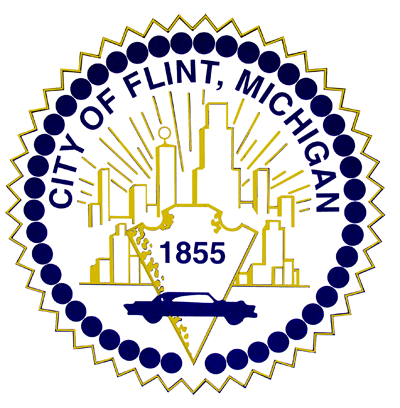 In 2015, voters in Flint, Michigan selected nine members to serve on the Flint Charter Review Commission.
In 2015, voters in Flint, Michigan selected nine members to serve on the Flint Charter Review Commission.
Commissioners spent the last two years drafting the charter to be approved in a citywide referendum election on August 8, 2017. The proposed charter includes lobbyist registration provisions and a one-year revolving door provision for public servants.
The proposed revisions may be put up to a vote up to three times. In the event voters reject the proposed charter after three referenda, the commission is dissolved.
March 27, 2017 •
Wisconsin Legislators Consider Revolving Door Ban
Wisconsin legislators introduced a bill to prohibit lawmakers from lobbying for at least one year after leaving legislative office. The bill, identical to a bill proposed during the last legislative session, was introduced with wide bipartisan support. Current state law […]
 Wisconsin legislators introduced a bill to prohibit lawmakers from lobbying for at least one year after leaving legislative office.
Wisconsin legislators introduced a bill to prohibit lawmakers from lobbying for at least one year after leaving legislative office.
The bill, identical to a bill proposed during the last legislative session, was introduced with wide bipartisan support.
Current state law establishes a revolving door provision for state employees and officials seeking to become lobbyists; the prohibition does not, however, extend to legislators.
January 16, 2017 •
Florida House Considering Constitutional Amendment to Prevent Revolving Door
A proposed amendment to the Florida Constitution seeks to slow the revolving door between public officials and lobbyists. Currently, members of the legislature, statewide officials, and appointed officials must wait two years before lobbying on behalf of a principal. The […]
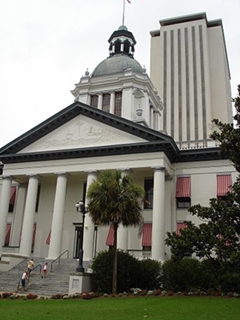 A proposed amendment to the Florida Constitution seeks to slow the revolving door between public officials and lobbyists.
A proposed amendment to the Florida Constitution seeks to slow the revolving door between public officials and lobbyists.
Currently, members of the legislature, statewide officials, and appointed officials must wait two years before lobbying on behalf of a principal.
The amendment, PCB 17-01, would extend the cooling-off period to six years. The change, proponents say, would prevent officials from ingratiating themselves to lobbyists in hopes of landing a high paying position after leaving office.
The amendment is being considered by the House Public Integrity and Ethics Committee and will be voted on at the Committee’s next meeting.
January 16, 2017 •
Washington State Lawmakers Introduce Ethics Bills
Lawmakers in Washington have introduced two bills to enhance campaign finance disclosure and ethics laws. Senate Bill 5108 aims to increase transparency of “gray money” by limiting political action committees from receiving 70 percent or more of their contributions from […]
 Lawmakers in Washington have introduced two bills to enhance campaign finance disclosure and ethics laws.
Lawmakers in Washington have introduced two bills to enhance campaign finance disclosure and ethics laws.
Senate Bill 5108 aims to increase transparency of “gray money” by limiting political action committees from receiving 70 percent or more of their contributions from other political committees.
Another proposal, House Bill 1159, seeks to establish revolving door provisions requiring former state officials to take a yearlong “cooling-off” period before they can become lobbyists.
June 22, 2016 •
Portland, Oregon to Reconsider Ethics Reforms
Today the Portland City Council is scheduled to reconsider adopting new ethics reform measures to broaden the revolving door prohibition to two years and increase the penalties associated with repeated ethics violations. The proposal would also close a loophole in […]
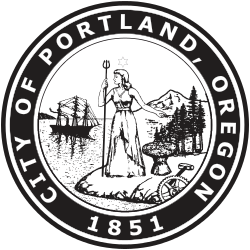 Today the Portland City Council is scheduled to reconsider adopting new ethics reform measures to broaden the revolving door prohibition to two years and increase the penalties associated with repeated ethics violations.
Today the Portland City Council is scheduled to reconsider adopting new ethics reform measures to broaden the revolving door prohibition to two years and increase the penalties associated with repeated ethics violations.
The proposal would also close a loophole in registration requirements, requiring lobbying entities that spend more than $1,000 a quarter on lobbying activities to register.
The proposed ordinance is a compromise that is less restrictive than a similar ordinance that was introduced in April 2016.
State and Federal Communications, Inc. provides research and consulting services for government relations professionals on lobbying laws, procurement lobbying laws, political contribution laws in the United States and Canada. Learn more by visiting stateandfed.com.


